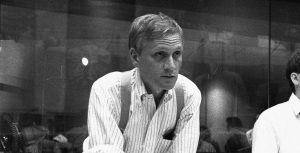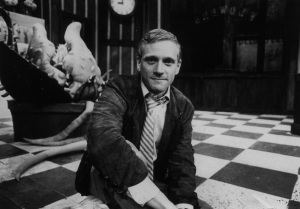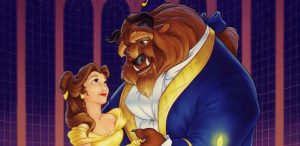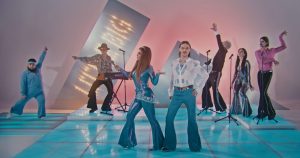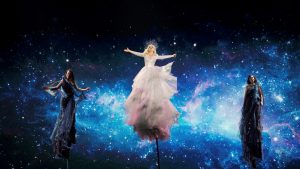2020 needed a savior of one kind or another, and we could do a lot worse than Dolly Parton singing Biblical messages of love and charity while dressed up in rhinestone-encrusted white cowboy boots and giant, glittery, golden angel wings, that’s all I’m saying. The legendary country singer’s new Netflix holiday movie Christmas On The Square might be just a bit too blindingly bright and sparkly for some, and perhaps it’s a little too fervently energetic for others, and for a lot of people it might be much too bizarre…but maybe all you’ve got to do is open your heart to Dolly (she’s very persuasive), and let the metaphorical Christmas lamplighter light up your holiday spirit and guide you out of the dark pit of despair. I don’t know. It sounds a lot more convincing when Dolly Parton is whispering it in that sing-song voice of hers.
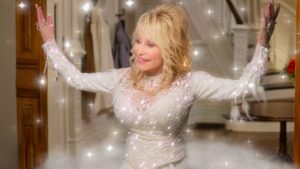
Christmas On The Square is an unabashedly weird movie, and the Christmas lamplighter is probably the least absurd of several dozen comically fantastical plot twists, characters, and story beats. Thankfully it won’t take you long to decide if it’s a new holiday classic for you and your family, or something better enjoyed over an alcoholic eggnog: within the first ten to fifteen minutes, you’ll have already been introduced to Angel (Dolly Parton herself, disguised as a homeless woman begging for “change”: I see what you did there, Dolly), you’ll have already witnessed the first of the film’s many frantic musical numbers, and you’ll have met the film’s villain/protagonist Regina (Christine Baranski, having the most fun out of anybody), a ruthless money-making machine whose current mission is to evict the inhabitants of her Midwestern hometown on Christmas Eve so a massive shopping mall can take its place. If that sounds suspiciously similar to the plot of A Christmas Carol, well…yes, it is essentially the same story. But perhaps not so much an adaptation of the original Charles Dickens novel as the more recent (and let’s be honest, far more enjoyable) Muppets Christmas Carol, which is also a quirky musical – although I must confess that the Muppets film has better songs than this one, and is far and away the better movie in general.

It’s not even that Parton’s songs for Christmas On The Square are bad, or badly-written, though they’re certainly nothing close to what she’s capable of at her best. It’s just that…she’s so rarely the one actually getting to sing them. And this isn’t some kind of “I Will Always Love You” situation, where she hands an already great song to a powerful vocalist who makes the song ten times better. Christmas On The Square has a surprisingly weak lineup of vocal talent beside Parton, Baranski, and Jenifer Lewis (who has just one song all to her own: “Queen Of Mean”, the most lyrically playful of the film’s musical numbers), and it gives most of its potentially awesome songs to Josh Segarra’s character, Pastor Christian. Segarra is a halfway-decent singer with the slightly grating rustic charm you’d expect from his goody-goody character, but his voice isn’t strong enough to carry songs like “Try”, which in particular demands to be either more powerful and show-stopping, or more quiet and intimate, than the middle-of-the-road performance we’re blessed with instead. And the film clearly had the means to go in either direction: one of the film’s most interesting singers, a choir member and supporting character played by Matthew Johnson, threatens to overshadow Segarra’s rendition of the song with his own soulful background vocals – while Dolly Parton herself gets to softly recite a single verse over the rushed end-credits. Segarra is better suited to songs like “You”, an overly earnest romantic duet between him and Mary Lane Haskell.
Earnestness is not something that typically poses a problem in holiday movies, where one expects – and indeed hopes – for the messaging to be sweet and simple. And it’s not even necessarily a problem here. But the strange thing about Christmas On The Square is how rapidly it pivots from “sweet and simple holiday musical” to “family-friendly soap-opera complete with emergency hospital visits, teen pregnancy, and complicated family-drama”, and then back again. And that’s not even factoring in the random, campy, semi-absurdist interludes focused on the Angels and their hijinks. The tonal inconsistencies feel unintentional and jarring rather than comedic, and it goes on like this until the end of the movie, which includes a truly bizarre third-act plot twist. Remember Last Christmas (which, incidentally, came out last Christmas), that George Michael-inspired musical about a woman falling in love with the ghost of the heart donor who saved her life the previous year? Yeah…think that kind of twist, but without the necessary comedic angle.

The movie’s secret weapon, however, is Dolly Parton – and it employs her at every opportune moment, just as a scene begins to lag or a musical number starts meandering. Some would say the movie relies on her a little too heavily at points, and sure, it probably does. But Parton’s aura is so strong and so all-encompassing (and most of the rest of the cast so boring and wooden), that it’s impossible to dismiss that as a fault. Personally, I think she could have done this whole thing as a one-woman show, and it would have been even better – and probably no weirder than it already is.
Besides, Dolly Parton poured a significant chunk of change into funding the Moderna COVID-19 vaccine while many wealthy celebrities were still under the impression we wanted to hear them incoherently singing from their palatial estates: I think she deserves to steal the spotlight in this weird, clunky, passion project that, without her, would probably be a forgettable mess. At least Christmas On The Square‘s tonal inconsistencies produced something strangely enjoyable, unlike those of a certain early-pandemic celebrity sing-along I could mention.
Movie Rating: 5.5/10



